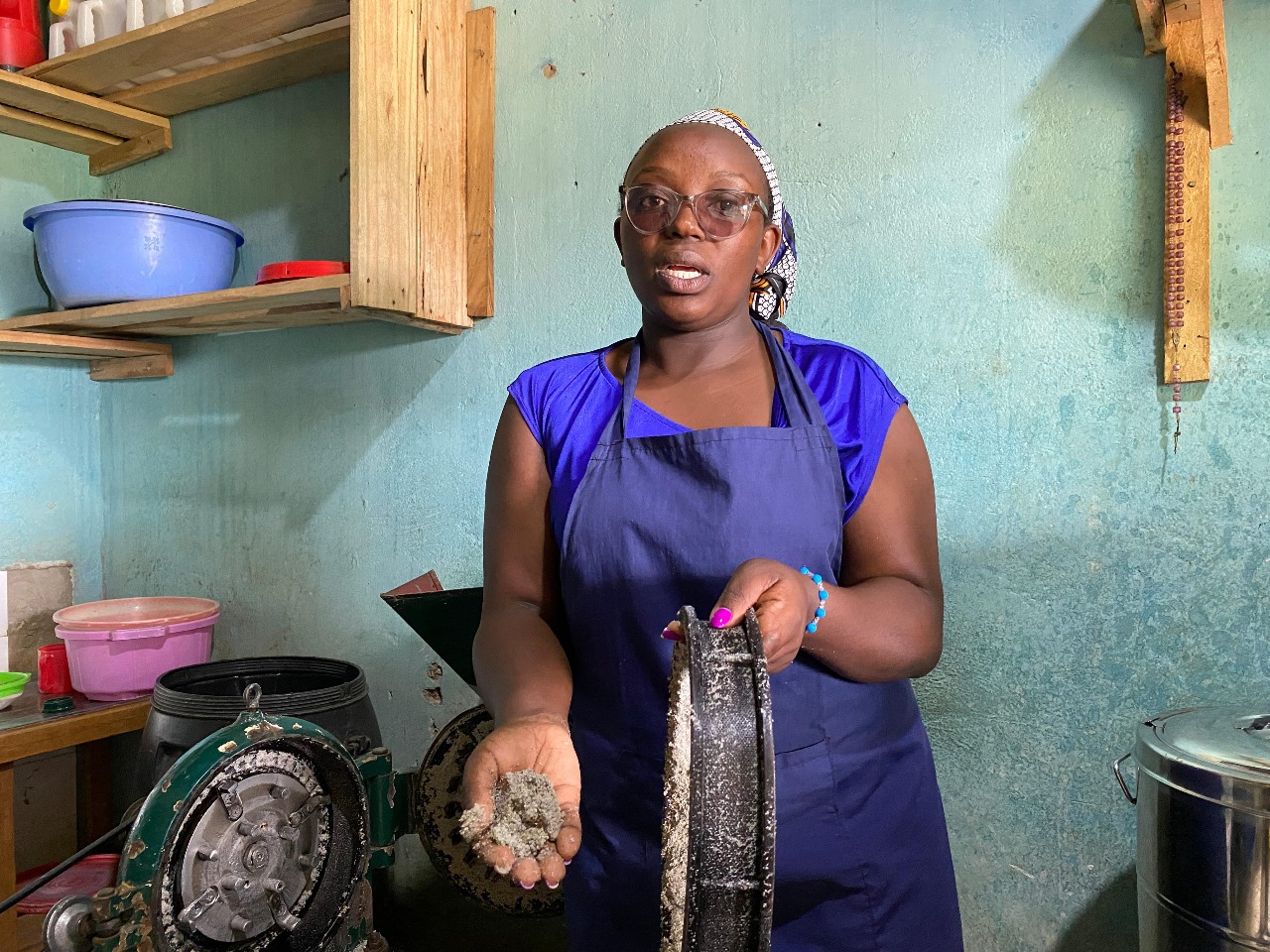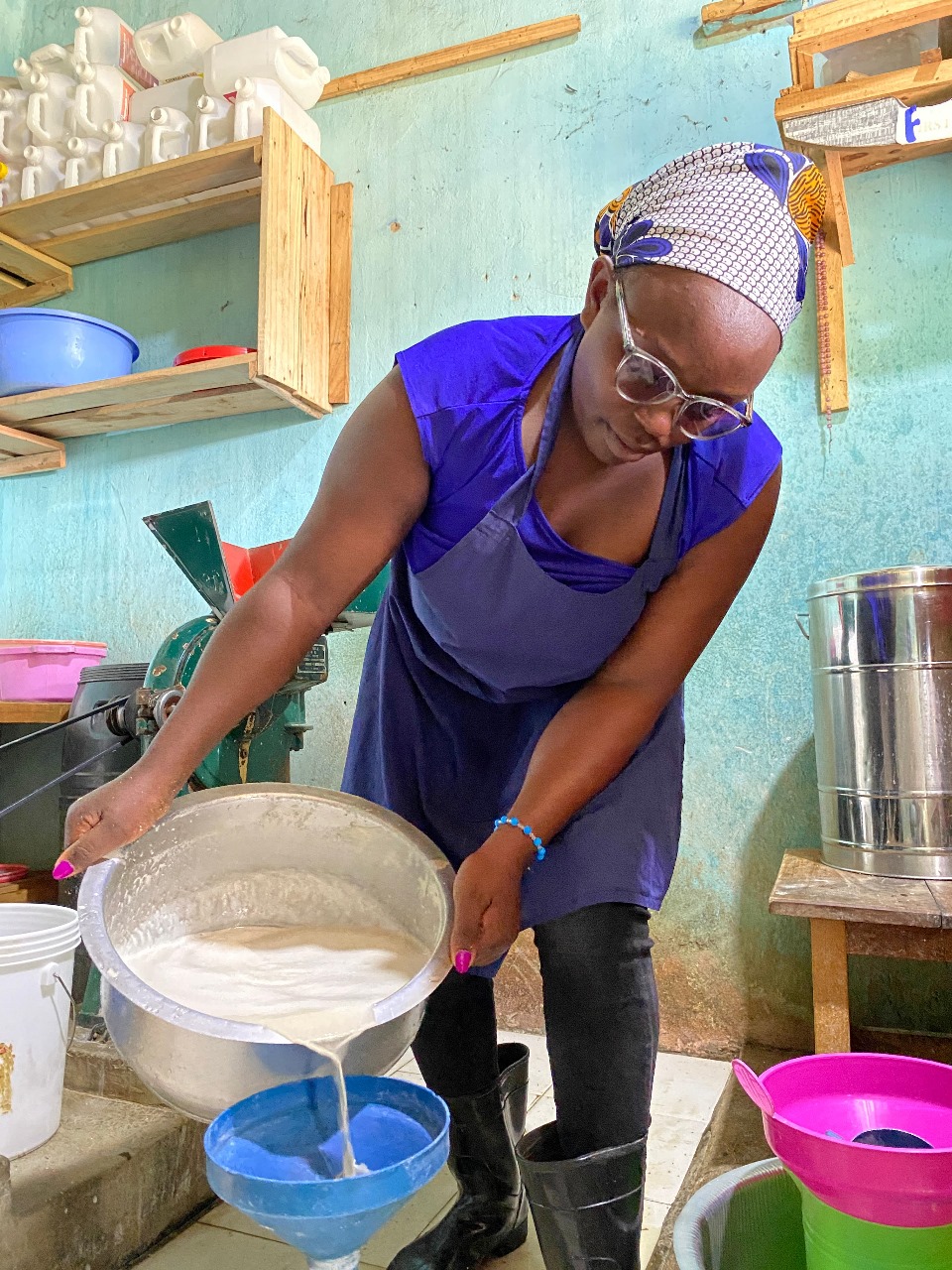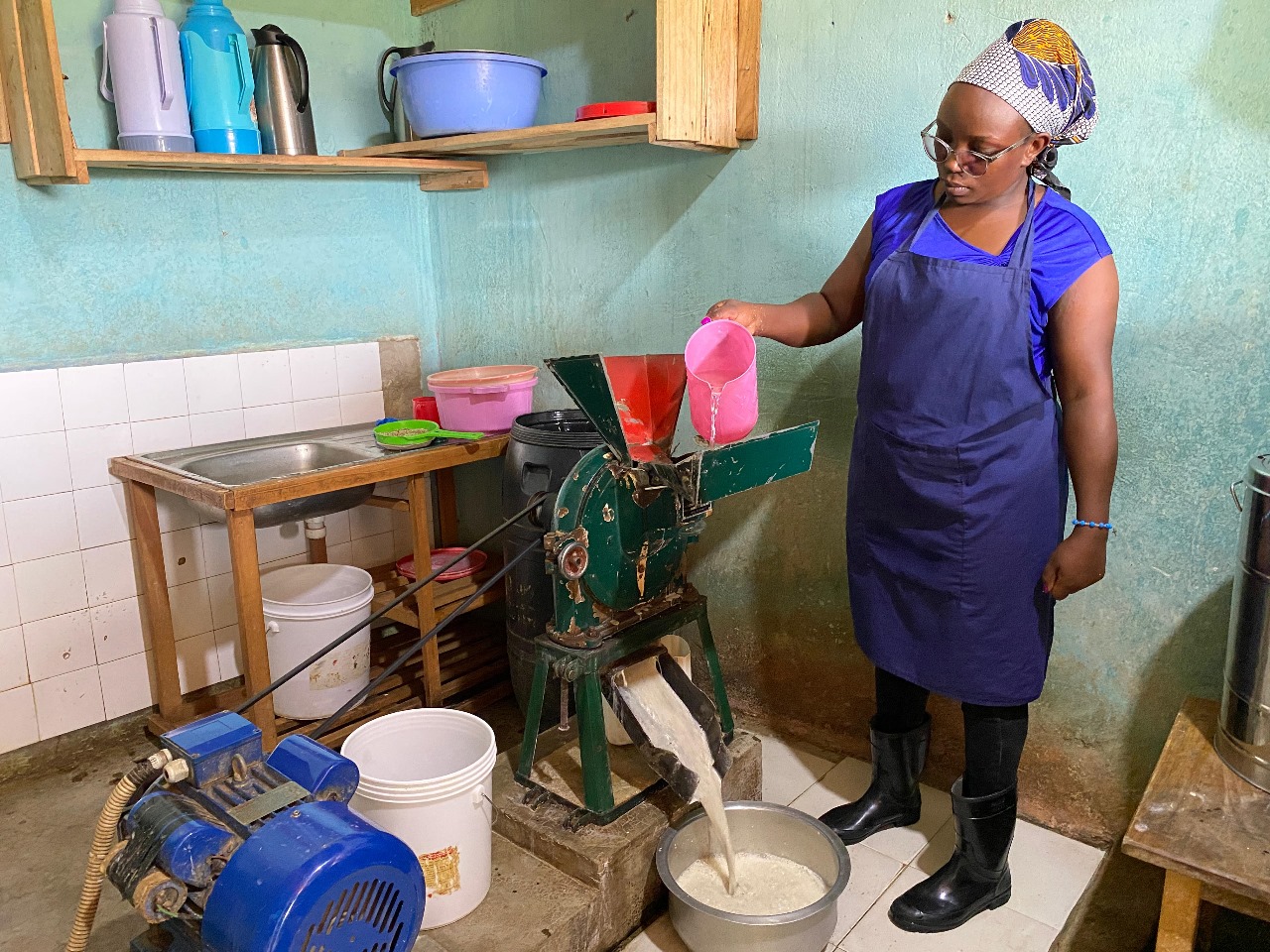 Lydia Njeri displays the pearl millet byproduct, which is eaten raw and is rich in calcium. It is mostly fed to expectant mothers.
Lydia Njeri displays the pearl millet byproduct, which is eaten raw and is rich in calcium. It is mostly fed to expectant mothers.It is dusty in this part of the country this season. In the near-moderate heat, 29-year-old Lydia Njeri Mwaura bends to mop her floor.
Tidying up after serving a client. Her back straightens, and she looks at us, beaming, “Karibu, Karibu,” she calls joyfully.
In the quiet Chaaria market in Mwanganthia ward, Meru County, Njeri, an agripreneur, is making significant investments in her wet milling business, which integrates porridge vending, cereals retailing, and the sale of blended flours, earning a weekly profit of Sh100,000.
Njeri, a proud mother of two, operates a hive of enterprises that deliver much-needed support in value addition to various agricultural value chains.
“My responsibility is to improve the standard of the cereals grown in Chaaria, which includes pearl millet, finger millet, green grams, cow peas, and groundnuts by milling and giving them numerous usages,” said Njeri.
From her rented premises in Chaaria Market, which serves as both a milling hub and porridge café, she operates a wet milling machine (locally known as Kithii kia ucuru).
“In our milling business, we focus on value addition by wet milling pearl millet and finger millet using a machine known as ‘Kithii.’ We blend the two grains to produce porridge, which we serve on-site and also deliver to customers who place external orders,” she explained.
 The businesswoman shows the porridge she makes using her mill.
The businesswoman shows the porridge she makes using her mill.According to reports, pearl millet and finger millet are highly nutritious and packed with proteins, vitamins, antioxidants, and essential minerals like calcium, iron, and zinc.
The porridge made from these grains is especially favoured by the elderly, people with diabetes, children, and pregnant or lactating mothers.
Rich in dietary fibre and complex carbohydrates, the porridge provides sustained energy, supports blood and bone health through its iron and calcium content, and offers plant-based protein for muscle maintenance.
The Bachelor of Science in Agriculture graduate began her entrepreneurial journey in 2021 after losing her job when the company she worked for collapsed due to the financial impact of the COVID-19 pandemic.
“Setting up the business was a struggle because I didn’t have enough money. I secured a loan of Sh200,000 from a friend and purchased the porridge milling machine and a stock worth Sh5000 that has supported me to date,” said Njeri. Her innovation extended to formulating "Uji Power," a fortified porridge made from a nutrient-rich blend of cassava, arrowroot, groundnuts, and milk.
The porridge gained popularity for its health benefits and taste, significantly increasing her customer base. Despite a tough start with little to no customers, she found a way to break into the market.
“I began hawking porridge as a strategic marketing move to create awareness about my new wet milling business. The goal was to attract more customers by also promoting the health benefits of the nutritious porridge in the market,” she stated.
For Njeri, innovation flows like a well-tended stream. Using her unique milling machine, lined with a traditional clay interior that guarantees a smooth, porridge-perfect blend, similar to traditional stone milling, she not only produces nutrient-rich flour but also harvests a treasured by-product: pearl millet residue.
This coarse, raw delicacy is naturally rich in calcium and has found a special place among pregnant mothers, who now cherish it as a wholesome alternative to the stones found on supermarket shelves and kiosks.
“It’s our very own traditional super snack,” Njeri remarked with pride. “Our foremothers handed this down to us during their stone-milling days, rubbing millet between rocks to create the perfect porridge flour. I encourage expectant mothers to embrace it and share it with their children because it's as pure and natural as it gets.”
 Lydia Njeri during the milling process.
Lydia Njeri during the milling process.Njeri utilises the nutritious residue to feed her poultry and sells the surplus to other poultry farmers, thereby creating an additional source of income. The business saw a breakthrough in 2024 after she enrolled in the Drought Tolerant Crops for Youth Jobs Creation Program, implemented by Africa Harvest Biotech Foundation International (the lead partner), International Crops Research Institute for the Semi-Arid Tropics (ICRISAT), in partnership with the Mastercard Foundation.
The training equipped her with vital business skills, resulting in improved operations and expanded services. “In 2021, we made around Sh 35,000 a week. Now, we are averaging Sh100,000 weekly, thanks to the training and restructuring of our services,” she says. Determined to apply her newly acquired knowledge, she leased half an acre of land and began growing sorghum, thereby reducing the cost of purchasing raw materials for wet milling.
Her first harvest yielded four 90kg bags, all of which were used in her milling business. She attributes part of her success to the program, which provides quality, improved seed as an incentive. Since joining the program in March 2024, Njeri has employed two staff members, 27-year-old Ruth Wairimu and 24-year-old Elosy Mukiri, further scaling her impact and creating employment for young people.
With improved earnings, she purchased a plot worth Sh800,000, which she plans to use to grow some of the cereals she currently sources externally. She says this will reduce operational costs and increase profit margins, as she won’t need to buy all the cereals she uses. However, Njeri conceded to various challenges she has endured in the business and called for both government and non-government interventions to empower more young people and women in business.
She urges the government to reduce the cost of business licenses. She calls for greater collaboration between the public and private sectors to provide quality seeds and inputs for smallholder farmers.
Since launching her business, Njeri has been paying an annual business permit fee of Sh3,000. However, in the 2023/24 financial year, the amount increased to Sh4,000, a cost she urges the Meru County government to reconsider for the sake of unemployed youth looking to venture into business. In total, she spends Sh7,200 on medical certificates and Sh4,000 on the business permit annually, costs she considers unfair for the survival of small businesses.
“The government should consider consolidating the different levies into one fair amount to encourage more youth to venture into business,” she said.
According to the Kenya National Bureau of Statistics report, in Kenya, micro, small and medium Enterprises (MSMEs) are vital to the economy, contributing approximately 40 per cent of the gross domestic product (GDP) and offering employment to an estimated 14.9 million Kenyans.
The DTCs 4 Youth Job Creation program seeks to scale commercialisation of drought-tolerant crops technologies to secure dignified and fulfilling work for 120,000 young people in rural Kenya, 70 per cent of whom are young women. Njeri affirms the importance of empowering women, saying, “Empowering women ensures a stable family and society. When a woman is empowered, the whole community thrives.”
To the unemployed youth fresh from school, Njeri has encouraged them to take the bold step of starting low. She recalled starting her business with just a five-litre can to vend the porridge, and that didn’t stop her from getting to where she is today. “No one should be afraid of starting a small business.
Starting a porridge business requires little capital. Young people should try starting small if they can’t find a large amount to start a business,” she advised. The general agriculture professional also expresses her pride over her business path, which she says operates in line with her profession. She says the educated youth should not be discouraged by a lack of white collar jobs. They should instead narrow their skills and knowledge towards the SMEs that offer a brighter promise to the Kenyan youth.
Njeri has attributed her success to her commitment she has rendered the job since the beginning. She noted that the majority of the Youth treat their job as a side source of income, hence ending up failing to accord their business the necessary attention it deserves.
“The majority might think I am not utilising my university education that my parent gave me, but for me, I feel very okay, very comfortable working in this business. I took it as my main business and not as a side hustle,” she said.
According to the World Bank, Kenya's unemployment rate stood at 5.6 per cent in 2023, reflecting a modest increase from 5.4 per cent in 2022. Youth unemployment remains a pressing concern, with 8.4 per cent of Kenyans aged 15–24 out of work.
While the overall rate appears relatively low, the quality of employment is a significant issue only 10 per cent of the workforce holds formal jobs, leaving many in unstable, low-paying informal roles.
Njeri hopes to extend her business by purchasing more flour milling machines to reduce the cost she incurs going to Meru town for flour milling.
She believes owning a flour mill will not only boost her income, but also save her customers the trouble of travelling to Meru town, which is about 18 kilometres away from Chaaria market.
“I spend Sh400 on transport to Meru for flour milling, plus extra charges for the milling service," she explained. "My goal is to purchase a flour milling machine within the next two years. It will be a more affordable option for customers in Chaaria, most of whom are farmers with easy access to cereals,” she noted.











